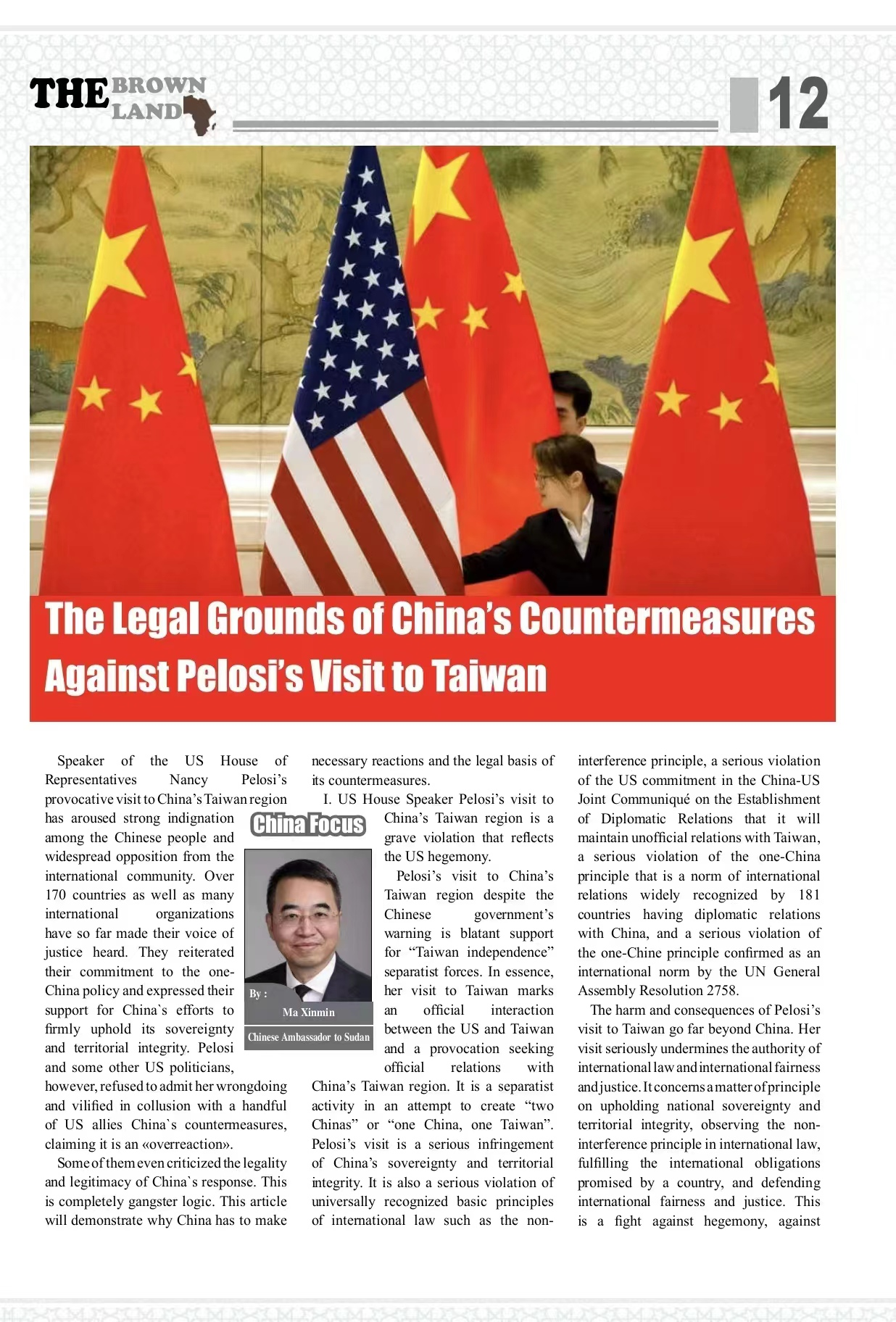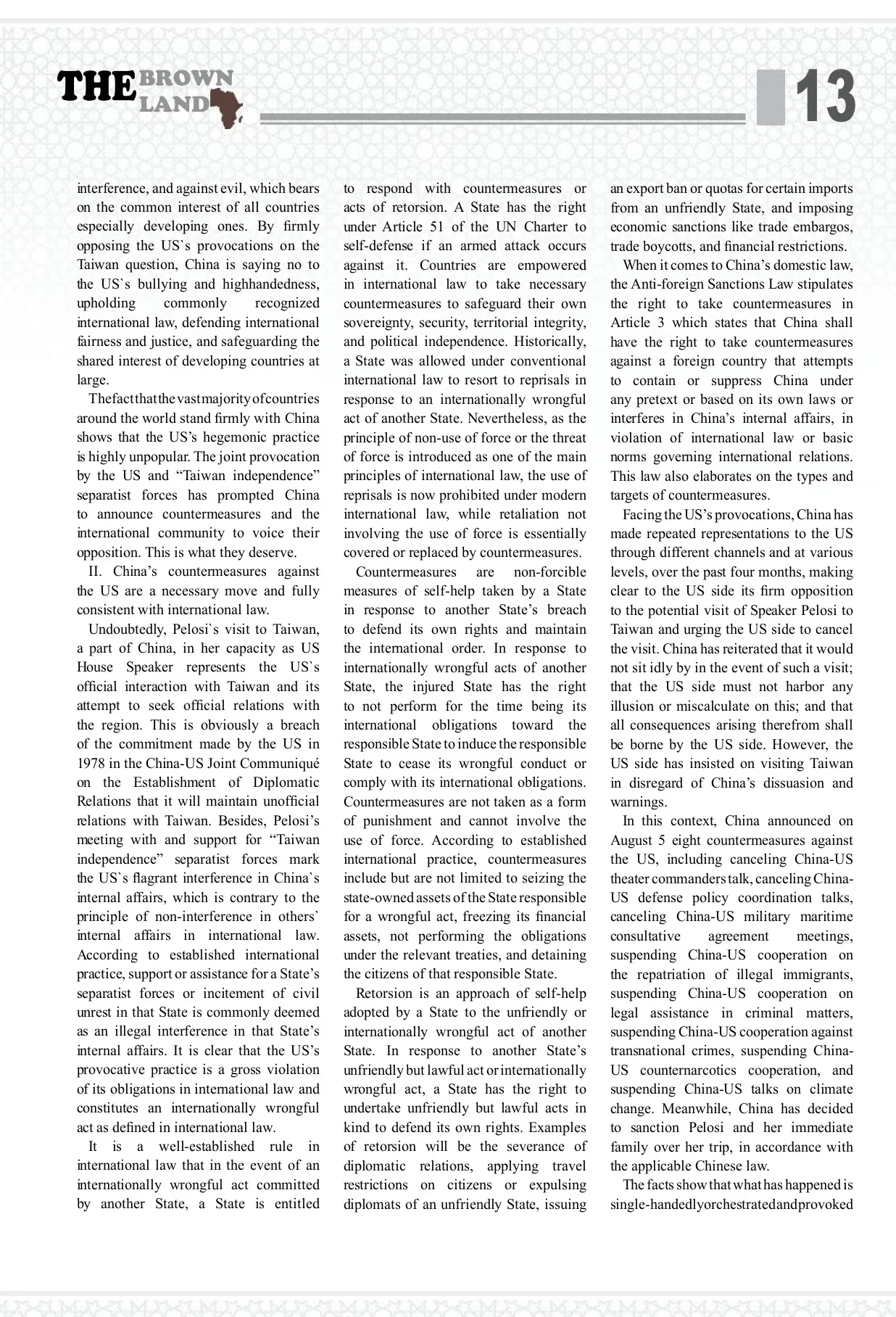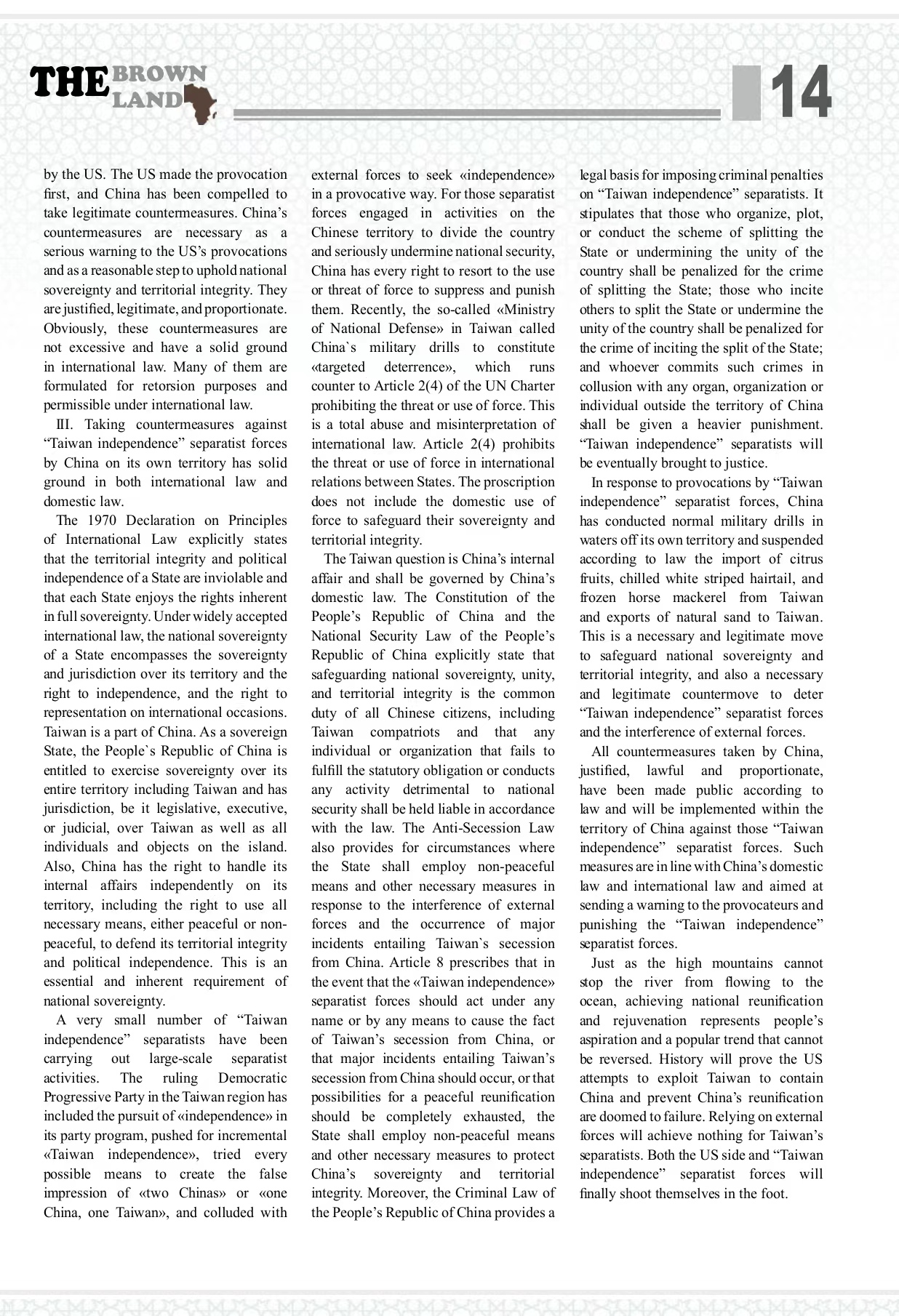On August 16, Chinese Ambassador to Sudan Ma Xinmin publishes an signature article titled Legal Grounds of China’s Counteractions Against Pelosi’s Visit to Taiwan for the China Focus Column on Brown Land. The full text is as follows:

Speaker of the US House of Representatives Nancy Pelosi’s provocative visit to China’s Taiwan region has aroused strong indignation among the Chinese people and widespread opposition from the international community. Over 170 countries as well as many international organizations have so far made their voice of justice heard. They reiterated their commitment to the one-China policy and expressed their support for China’s efforts to firmly uphold its sovereignty and territorial integrity. Pelosi and some other US politicians, however, refused to admit her wrongdoing and vilified in collusion with a handful of US allies as China’s counteractions as “overreaction”. Some of them even criticized the legality and legitimacy of China’s response. This is completely gangster logic. This article will demonstrate why China has to make necessary reactions and the legal basis of its counteractions.
I. US House Speaker Pelosi’s visit to China’s Taiwan region is a grave violation that reflects the US hegemony.
Pelosi’s visit to China’s Taiwan region despite the Chinese government’s warning is a blatant support for “Taiwan independence” separatist forces. In essence, her visit to Taiwan marks an official interaction between the US and Taiwan and a provocation seeking official relations with China’s Taiwan region. It is a separatist activity in an attempt to create “two Chinas” or “one China, one Taiwan”. Pelosi’s visit is a serious infringement of China’s sovereignty and territorial integrity. It is also a serious violation of universally recognized basic principles of international law such as the non-interference principle, a serious violation of the US commitment in the China-US Joint Communiqué on the Establishment of Diplomatic Relations that it will maintain unofficial relations with Taiwan, a serious violation of the one-China principle that is a norm of international relations widely recognized by 181 countries having diplomatic relations with China, and a serious violation of the one-Chine principle confirmed as an international norm by the UN General Assembly Resolution 2758.
The harm and consequences of Pelosi’s visit to Taiwan go far beyond China. Her visit seriously undermines the authority of international law and international fairness and justice. It concerns a matter of principle on upholding national sovereignty and territorial integrity, observing the non-interference principle in international law, fulfilling the international obligations promised by a country and defending international fairness and justice. This is a fight against hegemony, against interference and against evil, which bears on the common interest of all countries especially developing ones. By firmly opposing the US’s provocations on the Taiwan question, China is saying no to the US’s bullying and highhandedness, upholding commonly recognized international law, defending international fairness and justice, and safeguarding the shared interest of developing countries at large.
The fact that the vast majority of countries around the world stand firmly with China shows that the US’s hegemonic practice is highly unpopular. The joint provocation by the US and “Taiwan independence” separatist forces has prompted China to announce counteractions and the international community to voice their opposition. This is what they deserve.

II. China’s counteractions against the US are a necessary move and fully consistent with international law.
Undoubtedly, Pelosi’s visit to Taiwan, a part of China, in her capacity of US House Speaker represents the US’s official interaction with Taiwan and its attempt to seek official relations with the region. This is obviously a breach of the commitment made by the US in 1978 in the China-US Joint Communiqué on the Establishment of Diplomatic Relations that it will maintain unofficial relations with Taiwan. Besides, Pelosi’s meeting with and support for “Taiwan independence” separatist forces mark the US’s flagrant interference in China’s internal affair, which is contrary to the principle of non-interference in others’ internal affairs in international law. According to established international practice, support or assistance for a State’s separatist forces or incitement of civil unrest in that State is commonly deemed as an illegal interference in that State’s internal affairs. It is clear that the US’s provocative practice is a gross violation of its obligations in international law and constitutes an internationally wrongful act as defined in international law.
It is a well-established rule in international law that in the event of an internationally wrongful act committed by another State, a State is entitled to respond with countermeasures or acts of retorsion and a State has the right under Article 51 of the UN Charter to self-defense if an armed attack occurs against it. Countries are empowered in international law to take necessary countermeasures to safeguard their own sovereignty, security, territorial integrity and political independence. Historically, a State was allowed under conventional international law to resort to reprisals in response to an internationally wrongful act of another State. Nevertheless, as the principle of non-use of force or the threat of force is introduced as one of the main principles of international law, the use of reprisals is now prohibited under modern international law, while retaliation not involving the use of force is essentially covered or replaced by countermeasures.
Countermeasures are non-forcible measures of self-help taken by a State in response to another State’s breach so as to defend its own rights and maintain the international order. In response to internationally wrongful acts of another State, the injured State has the right to not perform for the time being its international obligations toward the responsible State so as to induce the responsible State to cease its wrongful conduct or comply with its international obligations. Countermeasures are not taken as a form of punishment and cannot involve the use of force. According to established international practice, countermeasures include but are not limited to seizing the state-owned assets of the State responsible for a wrongful act, freezing its financial assets, not performing the obligations under the relevant treaties, and detaining the citizens of that responsible State.
Retorsion is an approach of self-help adopted by a State to the unfriendly or internationally wrongful act of another State. In response to another State’s unfriendly but lawful act or internationally wrongful act, a State has the right to undertake unfriendly but lawful acts in kind to defend its own rights. Examples of retorsion will be the severance of diplomatic relations, applying travel restrictions on citizens or expulsing diplomats of an unfriendly State, issuing an export ban or quotas for certain imports from an unfriendly State, and imposing economic sanctions like trade embargos, trade boycotts and financial restrictions.
When it comes to China’s domestic law, the Anti-foreign Sanctions Law stipulates the right to take countermeasures in Article 3 which states that China shall have the right to take countermeasures against a foreign country that attempts to contain or suppress China under any pretext or based on its own laws or interferes in China’s internal affairs, in violation of international law or basic norms governing international relations. This law also elaborates on the types and targets of countermeasures.
Facing the US’s provocations, China has made repeated representations to the US through different channels and at various levels, over the past four months, making clear to the US side its firm opposition to the potential visit of Speaker Pelosi to Taiwan and urging the US side to cancel the visit. China has reiterated that it would not sit idly by in the event of such visit; that the US side must not harbor any illusion or miscalculate on this; and that all consequences arising therefrom shall be borne by the US side. However, the US side has insisted on visiting Taiwan in disregard of China’s dissuasion and warnings.
In this context, China announced on August 5 eight counteractions against the US, including canceling China-US theater commanders talk, canceling China-US defense policy coordination talks, canceling China-US military maritime consultative agreement meetings, suspending China-US cooperation on the repatriation of illegal immigrants, suspending China-US cooperation on legal assistance in criminal matters, suspending China-US cooperation against transnational crimes, suspending China-US counternarcotics cooperation, and suspending China-US talks on climate change. Meanwhile, China has decided to sanction Pelosi and her immediate family over her trip, in accordance with the applicable Chinese law.
The facts show that what has happened is single-handedly orchestrated and provoked by the US. The US made the provocation first, and China has been compelled to take legitimate counteractions. China’s counteractions are necessary as a serious warning to the US’s provocations and as a reasonable step to uphold national sovereignty and territorial integrity. They are justified, legitimate, and proportionate. Obviously, these counteractions are not excessive and have solid ground in international law. Many of them are formulated for retorsion purposes and permissible under international law.
III. Taking counteractions against “Taiwan independence” separatist forces by China on its own territory has solid ground in both international law and domestic law.
The 1970 Declaration on Principles of International Law explicitly states that the territorial integrity and political independence of a State are inviolable and that each State enjoys the rights inherent in full sovereignty. Any attempt aimed at the partial or total disruption of the national unity and territorial integrity of a State or country or at its political independence is incompatible with the purposes and principles of the Charter. Under widely accepted international law, national sovereignty of a State encompasses the sovereignty and jurisdiction over its territory, and the right to independence and the right of representation on international occasions. Taiwan is a part of China. As a sovereign State, the People’s Republic of China is entitled to exercise sovereignty over its entire territory including Taiwan and have jurisdiction, including legislative jurisdiction, executive jurisdiction and judicial jurisdiction, over Taiwan as well as all individuals and objects on the island. Also, China has the right to handle its internal affairs independently on its territory, including the right to use all necessary means, either peaceful or non-peaceful, to defend its territorial integrity and political independence. This is an essential and inherent requirement of national sovereignty.
A very small number of “Taiwan independence” separatists have been carrying out large-scale separatist activities. The ruling Democratic Progressive Party in the Taiwan region has included the pursuit of “independence” in its party program, pushed for incremental “Taiwan independence”, tried every possible means to create the false impression of “two Chinas” or “one China, one Taiwan”, and colluded with external forces to seek “independence” in a provocative way. For those separatist forces engaged in activities on the Chinese territory to divide the country and seriously undermine national security, China has every right to resort to the use or threat of force to suppress and punish them. Recently, the so-called “Ministry of National Defense” in Taiwan called China’s military drills constitute “targeted deterrence”, which runs counter to Article 2(4) of the UN Charter prohibiting the threat or use of force. This is a total abuse and misinterpretation of international law. Article 2(4) prohibits the threat or use of force in international relations between States. The proscription does not include the domestic use of force to safeguard their sovereignty and territorial integrity.
The Taiwan question is China’s internal affair and shall be governed by China’s domestic law. The Constitution of the People’s Republic of China and the National Security Law of the People’s Republic of China explicitly state that safeguarding national sovereignty, unity and territorial integrity is the common duty of all Chinese citizens, including Taiwan compatriots and that any individual or organization that fails to fulfill the statutory obligation or conducts any activity detrimental to national security shall be held liable in accordance with the law. The Anti-Secession Law also provides for circumstances where the State shall employ non-peaceful means and other necessary measures in response to interference of external forces and occurrence of major incidents entailing Taiwan’s secession from China. Article 8 prescribes that in the event that the “Taiwan independence” separatist forces should act under any name or by any means to cause the fact of Taiwan’s secession from China, or that major incidents entailing Taiwan’s secession from China should occur, or that possibilities for a peaceful reunification should be completely exhausted, the State shall employ non-peaceful means and other necessary measures to protect China’s sovereignty and territorial integrity. Moreover, the Criminal Law of the People’s Republic of China provides a legal basis for imposing criminal penalties on “Taiwan independence” separatists. It stipulates that those who organize, plot or conduct the scheme of splitting the State or undermining unity of the country shall be penalized for the crime of splitting the State; those who incite others to split the State or undermine unity of the country shall be penalized for the crime of inciting the split of the State; and whoever commits such crimes in collusion with any organ, organization or individual outside the territory of China shall be given a heavier punishment. “Taiwan independence” separatists will be eventually brought to justice.
In response to provocations by “Taiwan independence” separatist forces, China has conducted normal military drills in waters off its own territory and suspended according to law imports of citrus fruits, chilled white striped hairtail and frozen horse mackerel from Taiwan and exports of natural sand to Taiwan. This is a necessary and legitimate move to safeguard national sovereignty and territorial integrity, and also a necessary and legitimate countermove to deter “Taiwan independence” separatist forces and the interference of external forces.
All counteractions taken by China, justified, lawful and proportionate, have been made public according to law and will be implemented within the territory of China against those “Taiwan independence” separatist forces. Such measures are in line with China’s domestic law and international law and aimed at sending a warning to the provocateurs and punishing the “Taiwan independence” separatist forces.

Just as the high mountains cannot stop the river from flowing to the ocean, achieving national reunification and rejuvenation represents people’s aspiration and a popular trend that cannot be reversed. History will prove the US attempts to exploit Taiwan to contain China and prevent China’s reunification is doomed to failure. Relying on external forces will achieve nothing for Taiwan’s separatists. Both the US side and “Taiwan independence” separatist forces will finally shoot themselves in the foot.
